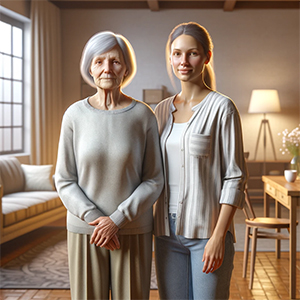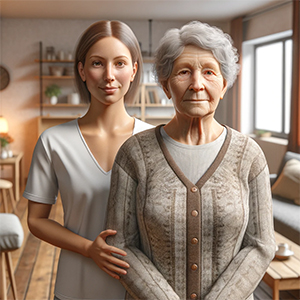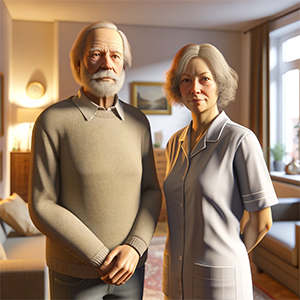Lesson 13
Directions and spatial orientation
I hope you had a nice day, as did I. Reading a book about German culture reminded me how important it is to combine language learning with cultural understanding. As your teacher, Ewa, I am excited to share my knowledge and experience with you. Today we will focus on Lesson 13 from our series on the Hrily platform, dedicated to caregivers of the elderly.
German vocabulary for caregivers

In today’s German for Caregivers – Directions and Spatial Orientation lesson, we will focus on vocabulary useful for everyday communication, especially as a senior caregiver.
Here are 10 words we will learn today:
- Direction – die Richtung
- Left –der/das Link
- Right– das Rechts
- Straight – Geradeaus
- Back – Rückwärts
- Top– Oben
- Down – Unten
- Next to – Neben
- Between – Zwischen
- Against – Gegenüber
These words are key in situations where a caregiver needs to help an elderly person with spatial orientation at home or during walks, for example.
Example dialogues – everyday phrases and expressions
Dialogue 1: Im Haus
Ewa: Herr Martin, wo sind Ihre Brille? (Mr. Martin, where are your glasses?)
Martin: Sie sind in einem großen Raum, auf dem Schrank, auf der linken Seite. (They are in the big room, on the cupboard, on the left)
Dialogue 2: Beim Einkaufen
Ewa: Sollen wir zuerst zum Bäcker oder zur Apotheke gehen?(Should we go to the bakery or the pharmacy first?)
Martin: Gehen wir zuerst zur Apotheke gehen. Sie ist geradeaus und dann rechts.(Let’s go to the pharmacy first. It’s straight, then right.)
Dialogue 3: Erinnerungen
Ewa: Herr Martin, erzählen Sie mir bitte, auf welchem Weg sind Sie früher zur Schule gegangen? (Mr. Martin, tell me which way you used to go to school.)
Martin: Oh, das war eine lange Reise. Ich musste durch den Park, über die Brücke und dann den Berg hinauf gehen. (Oh, it’s been a long way. I had to go through the park, over the bridge and then up the hill.)
These dialogues combine the practical use of German in the care of seniors with everyday situations. They make it easier for students to understand how to use the language in real-world contexts, while engaging them in interesting, life-like topics.
Interactive Exercises: Strengthening Language Skills

Task 1: Creating Scenarios
Assignment Description: Students are asked to create short storyboards in which they will use the vocabulary related to directions and spatial orientation, taught in the lesson. The scenarios should reflect situations that caregivers of the elderly in Germany may encounter, such as a visit to the doctor, a walk in the park or shopping at the supermarket.
Example: Ewa, the caregiver, helps her ward, Herrn Klaus, find his way to the nearest pharmacy. It uses words such as links (left), rechts (right), geradeaus (straight) to describe the route. For example: Herr Klaus, wir gehen zuerst geradeaus bis zur Kreuzung, dann nehmen wir die zweite Straße rechts. Die Apotheke ist auf der linken Seite. (Mr. Klaus, first we go straight to the intersection, then we turn right into the second street. The pharmacy is on the left.)
Task 2: Playing Dialogues
The task of the students in pairs is to prepare and present dialogues in which they will use vocabulary related to directions and spatial orientation. The scenarios should be realistic and reflect the day-to-day life of the caregiver for the elderly, such as helping to find the way to an unfamiliar location, organizing time off for the caregiver or giving instructions on home safety.
Example: Dialogue between Ewa’s caregiver and a senior, Mr. Martin, who wants to go to a nearby store on his own. Ewa uses words like Neben (next to), Gegenüber (opposite) to help him understand the location of the store. For example: Herr Martin, der Supermarkt ist nicht weit. Gehen Sie geradeaus bis zum Park, dann ist der Supermarkt gegenüber dem Eingang.
These assignments are aimed not only at learning vocabulary, but also at preparing students for practical use of the German language. The real-life situations they may encounter while working as caregivers for the elderly in Germany.
Interesting facts about the German language
In the context of caring for the elderly, one of the most fascinating features of the German language is its precise vocabulary describing different aspects of care. For example, there is the word Pflegebedürftigkeit, which literally translates to the need for long-term care. This word reflects perfectly the condition of a person who because of age or health condition, requires constant, specialized care.
This word has a special meaning in the context of the German health and social care system. In Germany, people with Pflegebedürftigkeit often qualify for different forms of support, which is important for carers and their caregivers. Understanding this term helps caregivers not only in everyday communication, but also in orientation in the care system, which is crucial when seeking employment in Germany as a caregiver for an elderly person.
This is just one of many words that underline how German can accurately and comprehensively describe various aspects of life, including care for the elderly. In our lessons, we constantly discover how the language reflects culture and social values, which is extremely helpful for understanding and acting effectively in a care environment.
Summary of Lesson 13: German for caregivers – Directions and Spatial Orientation

Thank you for your active participation in today’s German lessons for caregivers. I hope that the vocabulary about directions and spatial orientation, which we learned today, will prove to be not only useful, but also inspiring for you in your daily work with German seniors. The dialogues and interactive exercises we have done are designed to make it easier for you to communicate in real situations, while providing a solid linguistic foundation.
Remember that learning German involves not only words and grammar, but also understanding the culture and customs, which is indispensable in the work of a caregiver. Your commitment and willingness to learn are key to acquiring new skills that will help you in day-to-day care of seniors.
I look forward to our next online meeting on the topic Description of the House: Furniture and Rooms, where we will explore the skills of describing the environment of your mentee.
See you in the next lesson on the Hrily platform, where together we continue our journey into the German world for caregivers of the elderly!